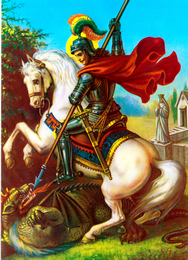Lives of the Saints
Our Models and Protectors
Spiritual Bouquet:
April 23

Saint George
Martyr, Patron of Soldiers
(† 303)
Saint George was born in Palestine of Christian parents, towards the close of the third century. In early youth he chose a soldier's life, and soon obtained the favor of Diocletian, who advanced him to the grade of tribune. But when the emperor began to persecute the Christians, George rebuked him at once for his cruelty, sternly and openly, and announced his resignation. Having foreseen that the words he would say might bring about his death, he had first distributed his wealth and clothing to the poor.
Young man, Diocletian said to him, think of your future! I am a Christian, George replied, and nothing in this world is the object either of my ambition or my regret. Nothing can shake my faith. He was subjected to a long series of torments, and finally beheaded.
There was something so heartening in the defiant cheerfulness of the young soldier, that every Christian felt a personal share in this triumph of Christian fortitude. Devotion to Saint George is very ancient and widespread in the Church. A fourth-century church dedicated to him at Constantinople is believed to have been built by Constantine, and his name is invoked in the most ancient liturgies. In Europe, Malta, Barcelona, Valencia, Aragon, Genoa, and England have chosen him as their patron. Even beyond the circle of Christendom he was held in honor, and invading Saracens learned to exempt from desecration the image of the one they hailed as the White-horsed Knight.
Reflection. Saint Bruno wrote: What shall I say of fortitude, without which neither wisdom nor justice is of any value? Fortitude is not of the body, but is a constancy of soul; with it we are conquerors in righteousness, patiently bearing all adversities, and in prosperity are not puffed up. Fortitude is never conquered, or if conquered, is not fortitude.
Little Pictorial Lives of the Saints, a compilation based on Butler's Lives of the Saints and other sources by John Gilmary Shea (Benziger Brothers: New York, 1894); Les Petits Bollandistes: Vies des Saints, by Msgr. Paul Guérin (Bloud et Barral: Paris, 1882), Vol. 4